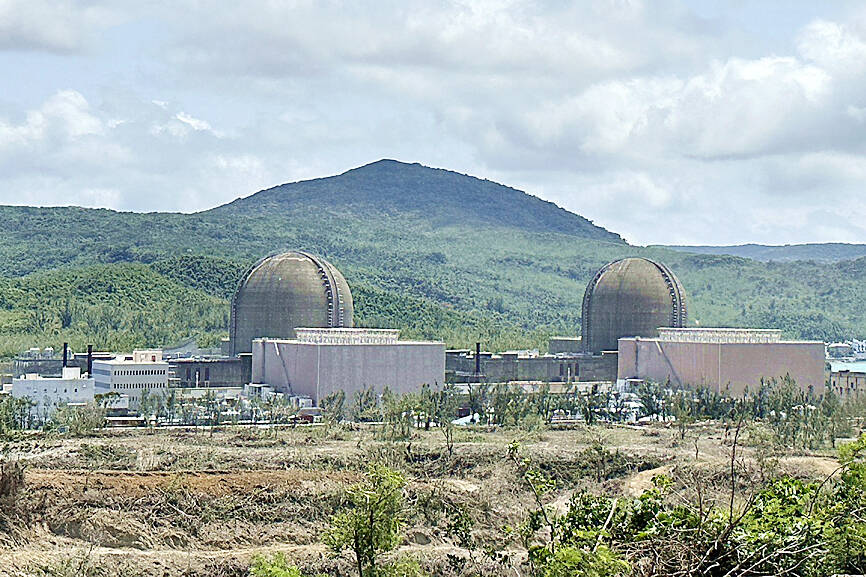The first reactor at Ma-anshan Nuclear Power Plant in Pingtung County is to retire on July 27 as planned, the Executive Yuan said yesterday, adding that the reactor would not be reactivated immediately even if the legislature passes bills to extend its operation.
The Executive Yuan reiterated its position in a news conference after the legislature’s Education and Culture Committee failed to pass a preliminary review of an amendment to Article 6 of the Nuclear Reactor Facilities Regulation Act (核子反應器設施管制法), which would relax the regulations governing the license renewal of nuclear power plants.
“Although the Jinshan Nuclear Power Plant and the Guosheng Nuclear Power Plant in New Taipei City have been decommissioned, the fuel rods are still in the nuclear reactor cores. Dry storage sites need to be set up first before the rods can be removed from the cores and properly stored,” Cabinet spokesman Chen Shi-kai (陳世凱) said.

Photo: Tsai Tsung-hsien, Taipei Times
“Given the high density population in Taiwan, it is difficult to find interim and final nuclear waste storage sites. We will continue to work on communicating with the public on this matter, but we have encountered difficulties doing so,” he said.
The existing regulations require that reactor No. 1 stop operating when its license expires on July 27, Chen said, adding that it would not be immediately reactivated even if the legislature passes the amendments.
“The government’s position remains that the reactivation of nuclear power plants can only proceed if storage sites for nuclear waste can be located, the safety of the nuclear power plants can be secured and the public reaches a consensus on the issues,” Chen said. “The government will also continue the energy transition through developing green energy and efforts to reduce carbon emissions.”
Taiwan Power Co in May said that electricity would come from renewable energy as well as natural gas and coal-powered plants after the Ma-anshan plant is decommissioned.
Aside from photovoltaics and offshore wind power, generators in gas-fired Fong Der Power Plant in Tainan, natural gas-powered Tatan Power Plant and coal-powered Hsinta Power Plant can collectively add 4.43 gigawatts to the power system.
In a field trip to the Ma-anshan plant on Wednesday, lawmakers shared different views on whether the operation of the power plant should be extended.
“It is not a simple ‘yes’ or ‘no’ question,” Democratic Progressive Party Legislator Hsu Fu-kuei (徐富癸) said. “It involves a change to the national energy policy, and input from residents of the Hengchun Peninsula must be taken into consideration.”
Given the long half-period of radioactive waste generated by the nuclear power plant, the government should compensate residents for the sacrifices they would make due to the national energy policy, he said.
How to use site of the plant to develop renewable energy should be planned ahead of time, Chiu said.
Chinese Nationalist Party (KMT) Legislator Su Ching-chuan (蘇清泉) said that he supported extending its operation, as it does not conflict with the development of green energy.
The development of artificial intelligence and other high-technology industries need a lot of power, which cannot be supplied through green energy alone, he said.

Chinese Nationalist Party (KMT) Chairman Eric Chu (朱立倫), spokeswoman Yang Chih-yu (楊智伃) and Legislator Hsieh Lung-chieh (謝龍介) would be summoned by police for questioning for leading an illegal assembly on Thursday evening last week, Minister of the Interior Liu Shyh-fang (劉世芳) said today. The three KMT officials led an assembly outside the Taipei City Prosecutors’ Office, a restricted area where public assembly is not allowed, protesting the questioning of several KMT staff and searches of KMT headquarters and offices in a recall petition forgery case. Chu, Yang and Hsieh are all suspected of contravening the Assembly and Parade Act (集會遊行法) by holding

PRAISE: Japanese visitor Takashi Kubota said the Taiwanese temple architecture images showcased in the AI Art Gallery were the most impressive displays he saw Taiwan does not have an official pavilion at the World Expo in Osaka, Japan, because of its diplomatic predicament, but the government-backed Tech World pavilion is drawing interest with its unique recreations of works by Taiwanese artists. The pavilion features an artificial intelligence (AI)-based art gallery showcasing works of famous Taiwanese artists from the Japanese colonial period using innovative technologies. Among its main simulated displays are Eastern gouache paintings by Chen Chin (陳進), Lin Yu-shan (林玉山) and Kuo Hsueh-hu (郭雪湖), who were the three young Taiwanese painters selected for the East Asian Painting exhibition in 1927. Gouache is a water-based

Taiwan would welcome the return of Honduras as a diplomatic ally if its next president decides to make such a move, Minister of Foreign Affairs Lin Chia-lung (林佳龍) said yesterday. “Of course, we would welcome Honduras if they want to restore diplomatic ties with Taiwan after their elections,” Lin said at a meeting of the legislature’s Foreign Affairs and National Defense Committee, when asked to comment on statements made by two of the three Honduran presidential candidates during the presidential campaign in the Central American country. Taiwan is paying close attention to the region as a whole in the wake of a

OFF-TARGET: More than 30,000 participants were expected to take part in the Games next month, but only 6,550 foreign and 19,400 Taiwanese athletes have registered Taipei city councilors yesterday blasted the organizers of next month’s World Masters Games over sudden timetable and venue changes, which they said have caused thousands of participants to back out of the international sporting event, among other organizational issues. They also cited visa delays and political interference by China as reasons many foreign athletes are requesting refunds for the event, to be held from May 17 to 30. Jointly organized by the Taipei and New Taipei City governments, the games have been rocked by numerous controversies since preparations began in 2020. Taipei City Councilor Lin Yen-feng (林延鳳) said yesterday that new measures by